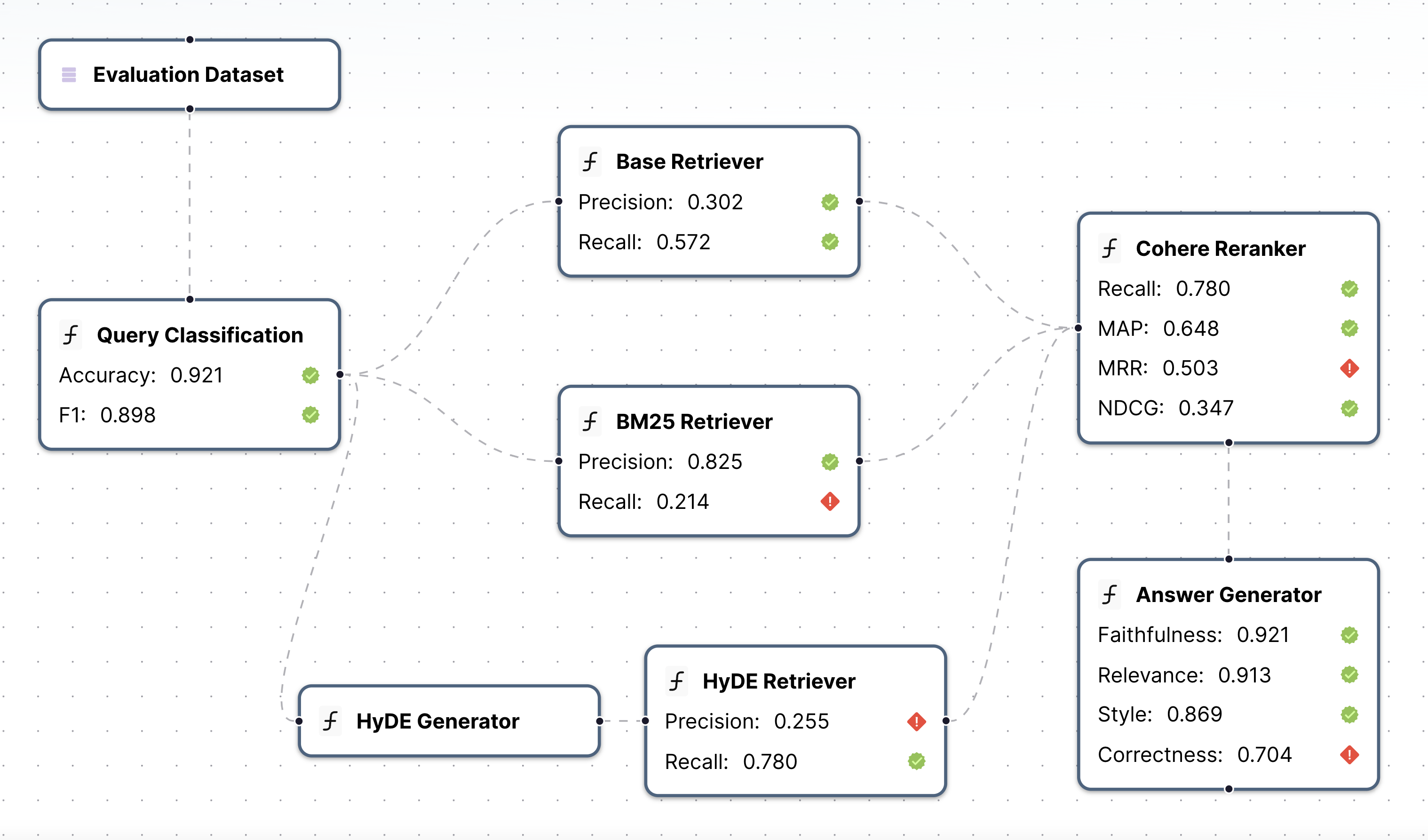continuous-eval is an open-source package created for data-driven evaluation of LLM-powered application.
-
Modularized Evaluation: Measure each module in the pipeline with tailored metrics.
-
Comprehensive Metric Library: Covers Retrieval-Augmented Generation (RAG), Code Generation, Agent Tool Use, Classification and a variety of other LLM use cases. Mix and match Deterministic, Semantic and LLM-based metrics.
-
Leverage User Feedback in Evaluation: Easily build a close-to-human ensemble evaluation pipeline with mathematical guarantees.
-
Synthetic Dataset Generation: Generate large-scale synthetic dataset to test your pipeline.
This code is provided as a PyPi package. To install it, run the following command:
python3 -m pip install continuous-evalif you want to install from source:
git clone https://github.com/relari-ai/continuous-eval.git && cd continuous-eval
poetry install --all-extrasTo run LLM-based metrics, the code requires at least one of the LLM API keys in .env. Take a look at the example env file .env.example.
Here's how you run a single metric on a datum. Check all available metrics here: link
from continuous_eval.metrics.retrieval import PrecisionRecallF1
datum = {
"question": "What is the capital of France?",
"retrieved_context": [
"Paris is the capital of France and its largest city.",
"Lyon is a major city in France.",
],
"ground_truth_context": ["Paris is the capital of France."],
"answer": "Paris",
"ground_truths": ["Paris"],
}
metric = PrecisionRecallF1()
print(metric(**datum))| Module | Category | Metrics |
|---|---|---|
| Retrieval | Deterministic | PrecisionRecallF1, RankedRetrievalMetrics, TokenCount |
| LLM-based | LLMBasedContextPrecision, LLMBasedContextCoverage | |
| Text Generation | Deterministic | DeterministicAnswerCorrectness, DeterministicFaithfulness, FleschKincaidReadability |
| Semantic | DebertaAnswerScores, BertAnswerRelevance, BertAnswerSimilarity | |
| LLM-based | LLMBasedFaithfulness, LLMBasedAnswerCorrectness, LLMBasedAnswerRelevance, LLMBasedStyleConsistency | |
| Classification | Deterministic | ClassificationAccuracy |
| Code Generation | Deterministic | CodeStringMatch, PythonASTSimilarity, SQLSyntaxMatch, SQLASTSimilarity |
| LLM-based | LLMBasedCodeGeneration | |
| Agent Tools | Deterministic | ToolSelectionAccuracy |
| Custom | Define your own metrics |
To define your own metrics, you only need to extend the Metric class implementing the __call__ method.
Optional methods are batch (if it is possible to implement optimizations for batch processing) and aggregate (to aggregate metrics results over multiple samples_).
Define modules in your pipeline and select corresponding metrics.
from continuous_eval.eval import Module, ModuleOutput, Pipeline, Dataset, EvaluationRunner
from continuous_eval.eval.logger import PipelineLogger
from continuous_eval.metrics.retrieval import PrecisionRecallF1, RankedRetrievalMetrics
from continuous_eval.metrics.generation.text import DeterministicAnswerCorrectness
from typing import List, Dict
dataset = Dataset("dataset_folder")
# Simple 3-step RAG pipeline with Retriever->Reranker->Generation
retriever = Module(
name="Retriever",
input=dataset.question,
output=List[str],
eval=[
PrecisionRecallF1().use(
retrieved_context=ModuleOutput(),
ground_truth_context=dataset.ground_truth_context,
),
],
)
reranker = Module(
name="reranker",
input=retriever,
output=List[Dict[str, str]],
eval=[
RankedRetrievalMetrics().use(
retrieved_context=ModuleOutput(),
ground_truth_context=dataset.ground_truth_context,
),
],
)
llm = Module(
name="answer_generator",
input=reranker,
output=str,
eval=[
FleschKincaidReadability().use(answer=ModuleOutput()),
DeterministicAnswerCorrectness().use(
answer=ModuleOutput(), ground_truth_answers=dataset.ground_truths
),
],
)
pipeline = Pipeline([retriever, reranker, llm], dataset=dataset)
print(pipeline.graph_repr()) # optional: visualize the pipelineNow you can run the evaluation on your pipeline
pipelog = PipelineLogger(pipeline=pipeline)
# now run your LLM application pipeline, and for each module, log the results:
pipelog.log(uid=sample_uid, module="module_name", value=data)
# Once you finish logging the data, you can use the EvaluationRunner to evaluate the logs
evalrunner = EvaluationRunner(pipeline)
metrics = evalrunner.evaluate(pipelog)
metrics.results() # returns a dictionary with the resultsTo run evaluation over an existing dataset (BYODataset), you can run the following:
dataset = Dataset(...)
evalrunner = EvaluationRunner(pipeline)
metrics = evalrunner.evaluate(dataset)Ground truth data, or reference data, is important for evaluation as it can offer a comprehensive and consistent measurement of system performance. However, it is often costly and time-consuming to manually curate such a golden dataset. We have created a synthetic data pipeline that can custom generate user interaction data for a variety of use cases such as RAG, agents, copilots. They can serve a starting point for a golden dataset for evaluation or for other training purposes.
To generate custom synthetic data, please visit Relari to create a free account and you can then generate custom synthetic golden datasets through the Relari Cloud.
Interested in contributing? See our Contribution Guide for more details.
- Docs: link
- Examples Repo: end-to-end example repo
- Blog Posts:
- Practical Guide to RAG Pipeline Evaluation: Part 1: Retrieval, Part 2: Generation
- How important is a Golden Dataset for LLM evaluation? (link)
- How to evaluate complex GenAI Apps: a granular approach (link)
- How to Make the Most Out of LLM Production Data: Simulated User Feedback (link)
- Generate Synthetic Data to Test LLM Applications (link)
- Discord: Join our community of LLM developers Discord
- Reach out to founders: Email or Schedule a chat
This project is licensed under the Apache 2.0 - see the LICENSE file for details.
We monitor basic anonymous usage statistics to understand our users' preferences, inform new features, and identify areas that might need improvement. You can take a look at exactly what we track in the telemetry code
To disable usage-tracking you set the CONTINUOUS_EVAL_DO_NOT_TRACK flag to true.





